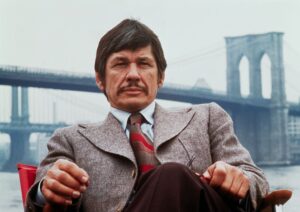Charles Bronson’s early life in a coal mining town shaped his perception of himself and the world. Born in 1921 near Pittsburgh, he endured poverty and hardship.
Raised in a cramped shack near the coal tracks, he recalled wearing hand-me-downs and experiencing the death of his father as a teenager. Forced to work as a coal miner to support his family, he described feeling like the “lowliest of all forms of man.”

Reflecting on his time in the mines, Bronson expressed the physical toll and psychological burden it imposed. He remembered the constant presence of coal dust, rough hands, and a pervasive inferiority complex among miners. Despite the harsh conditions, he found solace in his military service during World War II, which provided him with stability, nourishment, and opportunities for self-improvement.
Bronson’s journey to stardom began after the war when he pursued acting. Despite initial challenges, he eventually landed roles in notable films like “Vera Cruz” and “Machine-Gun Kelly.” He adopted the name Bronson to navigate the anti-Communist sentiment of the era. His breakthrough came with the 1974 film “Death Wish,” leading to a string of successful sequels and establishing him as an iconic action star.
Despite his professional success, Bronson grappled with personal challenges, including multiple marriages and the loss of loved ones to cancer. In his later years, he battled Alzheimer’s disease, which gradually diminished his vitality. He passed away in 2003 at the age of 81, leaving behind a legacy in cinema and a family that cherished his memory.
Bronson’s life story serves as a testament to resilience in the face of adversity, illustrating how one man transcended his humble origins to leave an indelible mark on the world of entertainment.



